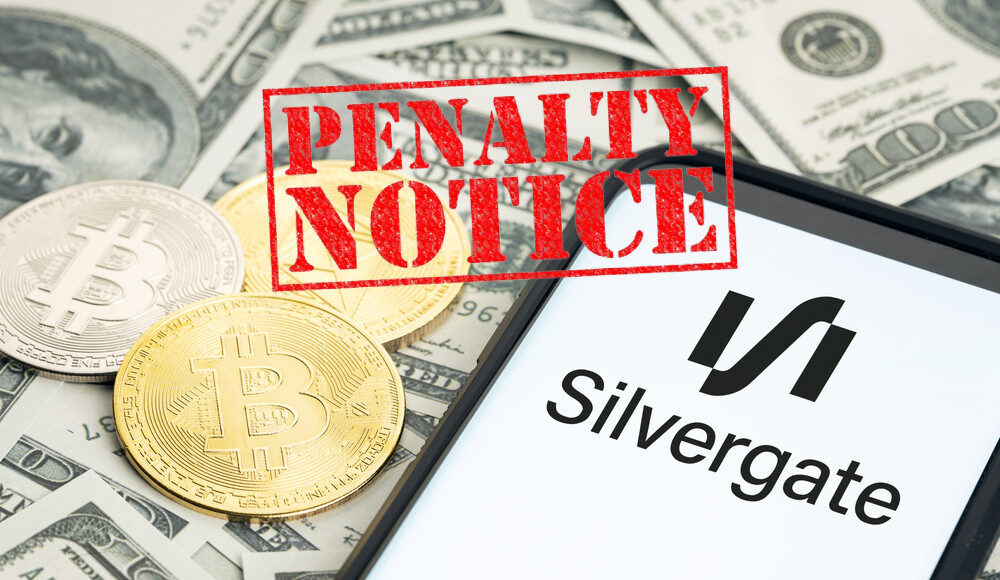In a significant legal resolution, Silvergate Bank has agreed to pay $63 million to U.S. regulators, including the SEC, to settle allegations concerning misleading statements about its anti-money laundering (AML) program. This event underscores the growing regulatory focus on financial institutions within the cryptocurrency sector. The SEC’s lawsuit highlighted Silvergate Bank’s alleged non-compliance with the Bank Secrecy Act, creating waves across the crypto community, particularly given Silvergate’s association with the now-defunct FTX exchange.
Allegations and Settlement Details
The SEC accused Silvergate Bank of providing false information about the effectiveness of its AML program. According to the complaint, Silvergate’s misleading statements enabled it to attract substantial business from the cryptocurrency market, including its dealings with FTX. The Bank Secrecy Act requires financial institutions to implement robust AML protocols to prevent illicit activities. Silvergate’s purported failure to meet these standards led to a thorough investigation by the SEC, culminating in the $63 million settlement.
Multi-Agency Regulatory Action
Silvergate’s settlement involves payments to the SEC, the Federal Reserve, and California state regulators. This case exemplifies the collaborative effort among regulatory bodies to address compliance deficiencies in financial institutions linked to cryptocurrency transactions. The increased vigilance of these authorities aims to ensure transparency and adherence to AML standards across the financial sector.
Implications for the Cryptocurrency Industry
This settlement has significant implications for the broader cryptocurrency industry. Financial institutions involved with digital assets are likely to face stricter oversight and more rigorous enforcement of AML standards. The Silvergate case serves as a stark reminder of the potential consequences of non-compliance and the critical need for financial entities to maintain robust AML measures.
Impact on Silvergate Bank
Beyond the financial penalties, Silvergate Bank’s reputation has been significantly affected. Its close association with FTX, which faced its legal troubles before its collapse, has further intensified scrutiny of Silvergate’s business practices. This development is likely to prompt other crypto-friendly banks to reassess their compliance frameworks to avoid similar issues.
>>> Read more: FTX Bankruptcy: Are Customers Truly Getting Full Repayment?
Future of Regulatory Frameworks
Experts suggest that the Silvergate settlement could lead to more stringent regulatory frameworks for banks involved in the crypto market. The growing involvement of mainstream financial institutions in cryptocurrency necessitates a balance between innovation and regulatory compliance. As regulators aim to protect the financial system from abuse, banks must prioritize robust AML measures and transparent reporting practices.
The Silvergate Bank settlement with the SEC marks a pivotal moment for the cryptocurrency sector. It signals a shift towards more rigorous regulatory enforcement and highlights the importance of compliance. This case will likely serve as a precedent for future regulatory actions. It emphasizes the need for financial institutions to adhere to legal standards while navigating the complexities of the crypto landscape.
By addressing these compliance failures, regulators aim to bolster the integrity of the financial system. Ensuring that institutions engaged in cryptocurrency transactions are held to high standards of accountability and transparency is paramount. As the crypto industry continues to evolve, the lessons learned from the Silvergate case will be crucial in shaping a secure and compliant ecosystem for digital finance.
Readers’ frequently asked questions
What specific allegations did the SEC make against Silvergate Bank?
The SEC accused Silvergate Bank of making misleading statements about the effectiveness of its anti-money laundering (AML) program. The allegations centered on Silvergate’s purported failure to comply with the Bank Secrecy Act (BSA). The act mandates financial institutions to implement robust AML protocols to prevent illicit activities like money laundering and terrorist financing. The SEC claimed that Silvergate’s false statements allowed it to attract more business from the cryptocurrency sector. That included significant dealings with the now-defunct FTX exchange. This non-compliance reportedly compromised the integrity of financial transactions facilitated by Silvergate.
What are the broader implications of this settlement for the cryptocurrency industry?
The $63 million settlement between Silvergate Bank and U.S. regulators, including the SEC, underscores the heightened regulatory scrutiny on financial institutions involved with cryptocurrencies. This case highlights the critical need for banks to adhere to strict AML standards and the potential consequences of failing to do so. It serves as a cautionary tale for other crypto-friendly financial institutions, emphasizing the importance of maintaining robust compliance frameworks. The settlement is likely to prompt regulators to implement more stringent oversight measures across the industry. They must ensure that all entities engaged in cryptocurrency transactions meet high standards of accountability and transparency.
How does Silvergate Bank’s association with FTX affect its reputation and operations?
Silvergate Bank’s close association with the collapsed cryptocurrency exchange FTX has significantly impacted its reputation. The legal troubles faced by FTX, coupled with Silvergate’s alleged compliance failures, have intensified regulatory scrutiny of the bank’s business practices. This association has led to a comprehensive investigation by regulatory bodies and a substantial financial penalty. As a result, Silvergate’s reputation within the crypto community and among traditional financial institutions has been tarnished. Moving forward, Silvergate and other similar banks are likely to reassess and strengthen their compliance measures. They will want to avoid similar issues and restore trust in their operations.
What Is In It For You? Action Items You Might Want to Consider
Reevaluate Your Banking Partners
Given the regulatory scrutiny that Silvergate Bank is under, it’s crucial to reassess your banking relationships. Ensure that your banking partners have robust compliance frameworks and a strong track record of adhering to anti-money laundering (AML) regulations. This will help safeguard your investments and maintain seamless trading operations without legal interruptions.
Stay Informed on Regulatory Changes
The settlement between Silvergate Bank and U.S. regulators indicates that stricter regulatory measures could be on the horizon for financial institutions involved in the cryptocurrency market. Stay updated on regulatory developments and adapt your trading strategies accordingly.
Diversify Your Assets and Trading Platforms
The fallout from Silvergate’s legal issues and its connection to the FTX collapse highlights the risks of relying heavily on a single financial institution or trading platform. Diversify your assets across multiple platforms to mitigate risk. Consider using decentralized finance (DeFi) platforms alongside traditional exchanges to spread your exposure and enhance the security of your investments.










[…] is already grappling with the fallout from the collapse of other crypto-friendly banks, such as Silvergate Bank and Signature Bank, earlier in 2023. The dwindling number of banks willing to engage with digital […]
[…] regulatory scrutiny on banks with crypto connections. Following the high-profile collapses of Silvergate and Signature Banks in 2023, both of which had strong ties to the cryptocurrency industry, the […]